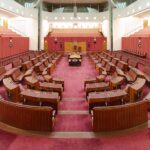Victorian Premier Apologises for Branch Stacking

Victorian Premier Dan Andrews publicly apologised this week, following the final report and recommendations from Operation Watts – a joint probe by the State Ombudsman and the Independent Broad-based Anti-corruption Commission (IBAC) – into the conduct of members of the state’s Labor Party.
Branch stacking
The investigation by two of the state’s corruption watchdogs was initiated in 2020 after allegations of ‘branch stacking’ – a process used to recruit party members by paying for their membership fees.
Branch stacking is not illegal, but it’s not exactly moral either. It inflates membership numbers while posing serious threat to the legitimacy of the pre-selection process by increasing the prospects of specific persons being selected when they would not have been in the absence of the process.
A ‘cancerous effect’ on democratic traditions
In fact, a report way back in the early 2000’s by former Labor leaders Bob Hawke and Neville Wran described ‘branch stacking’ as having a “cancerous effect” on democratic traditions.
The branch stacking was first exposed by The Age newspaper and the 60 Minutes television programme.
Their reports included allegations of industrial-scale branch stacking by former state minister Adem Somyurek. Mr Somyurek was dismissed from cabinet in the wake of the claims and other Labor politicians including Marlene Kairouz, Luke Donnellan and Robin Scott resigned.
And while Premier Daniel Andrews was not implicated in the scandal himself, and did give testimony privately to the IBAC inquiries, there are now calls for his resignation.
He has been Premier of Victoria since December 2014 and the leader of the Victorian branch of the Australian Labor Party (ALP) since December 2010 – some of the misconduct occurred under his leadership.
In recent days, he told the media: “I take full responsibility for that conduct, that is what the top job is about, and I apologise for it.”
More checks and balances required
Mr Andrews also said his government will adopt all 21 of the report’s recommendations, including establishing a Parliamentary Ethics Committee and Parliamentary Integrity Commissioner, as well as reforming parliament’s privileges committee to reduce the dominance of the majority party.
Furthermore, Mr Andrews has promised to introduce legislation barring major political parties from receiving public funding unless they properly policed party memberships, including ensuring memberships were paid by traceable means and that photo ID checks are carried out on new members. But that’s that.
Because of the weak laws around political accountability in Australia there is limited potential for prosecution over misconduct, even when it is backed by a significant body of evidence.
In the words of IBAC Commissioner Robert Redlich, “We criticise a legislative framework that provides few, if any, consequences for abusing public resources and that allows such conduct to continue unchecked.
No criminal prosecutions
IBAC heard numerous examples of unethical behaviour within the party during the investigative hearings, and “the evidence, both public and private, painted a compelling picture of jobs on the public purse according to factional loyalties, and widespread misuse of public resources for political purposes.
But, even in the wake of its overall findings it has admitted “the difficulties in proof and the state of the law are such that we cannot recommend prosecution.”
Certainly, Dan Andrews has made some solid commitments around improving the status quo, but let’s not forget that IBAC uncovered “egregious” and “extensive misconduct” by Victorian Labor MPs, including rampant nepotism, widespread misuse of public resources and a culture of branch stacking that reaches back years, even decades.
Victorians are now expected just to ‘move on’ and hope that everything will be amended over time with the introduction of more adequate checks and balances.
What this pretty much amounts to is “shutting the gate after the horse has bolted.”
Transparency and accountability still need to be addressed
Misconduct amongst politicians is rife in this country – as evidenced by a string of stories in recent years around pork barrelling and misuse of public funds, document shredding, bullying, harassment, and the list goes on…
And while it’s all very well to implement better processes and an integrity commission or two, we need these organisations and oversight bodies, including IBAC and its New South Wales counterpart, the ICAC, to be empowered with sufficient resources and backed by appropriate legislation which will actually make misconduct, such as the misuse of public funds by politicians a criminal offence.
Any Australian taxpayer will tell you that it seems vastly unjust that their hard-earned dollars are misspent by politicians trying to establish political favour of some sort or another, rather than actually spending money on issues that are of need and importance to the communities they are elected to serve.
Transparency is one thing that needs to be better established, but so too does accountability. When politicians misuse public funds they should face serious consequences, not just a ‘slap’ on the wrist.’







